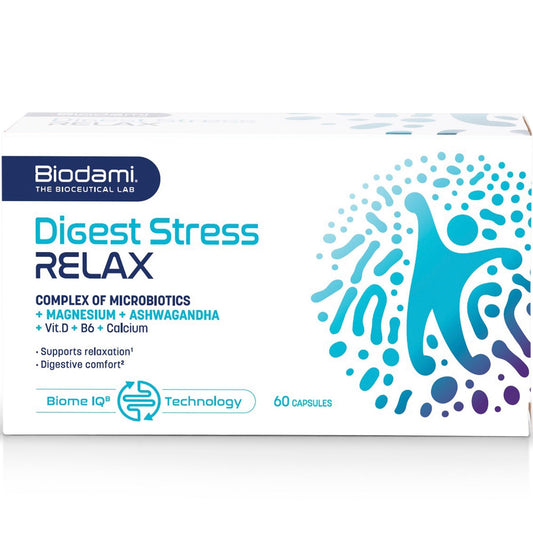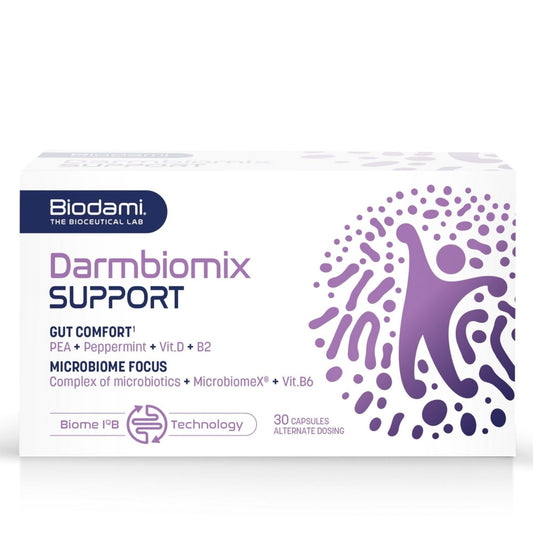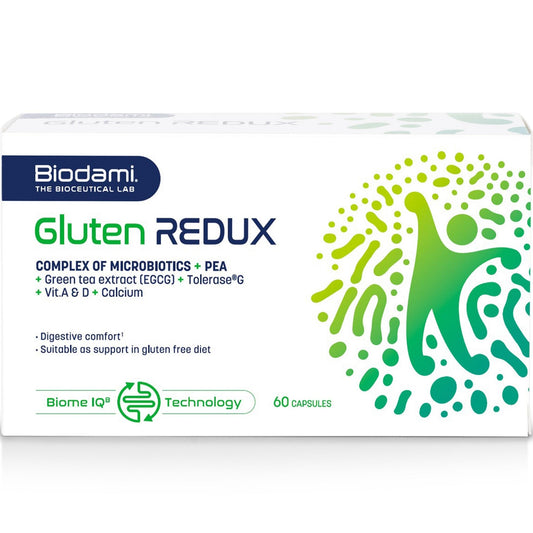Everybody experiences stress in their day-to-day lives. But the way people handle, or even just respond to stressful situations, differs for everyone. Some people are seemingly capable of staying relatively calm when dealing with a stressful situation. Some people become more frantic and distraught. Some people even “stress” so much, that they can feel it in their guts. Maybe you have even experienced this gut discomfort yourself before.
It is hard to quantify, but a notable number of people will regularly experience stress related gut discomfort. That’s because stress links to our bodies more than we know. But what do we even mean when we say that someone is experiencing “stress”?

WHAT IS STRESS?
As we naturally face difficulties and threats in our daily lives, stress is a natural human reaction to tackle such things. It can be described as a condition of anxiety or emotional strain brought about by these challenging circumstances, and is experienced by everyone to varying degrees.
Some key points to remember about stress are:
- To varying degrees, everyone experiences stress as an innate human response to challenging circumstances.
- Stress impacts both the mind and the body.
- There are coping strategies that can be learned and developed to help deal with stress better.
- In moderate amounts, stress can even be advantageous: it can support us in accomplishing tasks, adapting to new circumstances, or enhance motivation, alertness and ability to avoid threats.
- However, prolonged stress brings the following disadvantages: physical and mental health issues like the lack of relief and relaxation, heart disease, or high blood pressure.
WHEN DO WE SPEAK OF CHRONIC STRESS?
Prolonged stress is also referred to as chronic stress that arises as a response to continuous internal and external stressors and puts the body in a state of constant alertness. These stressors usually consist of circumstances or occurrences challenging our self-perception or sense of control over situations.
WHAT ARE THE EFFECTS OF CHRONIC STRESS?
If unaddressed, chronic stress can have detrimental effects like:
- Fatigue,
- Irritability,
- Difficulties in concentration,
- Poor sleep,
- Disorganized thoughts,
- Change in appetite,
- And digestive issues.
This constant state of alertness being upheld by chronic stress can further lead to health complications if not adequately managed or even addressed with a healthcare professional.
Stress coping strategies usually involve lifestyle changes like keeping a healthy sleep schedule, a balanced diet, or quitting unhealthy habits like smoking.
Otherwise, chronic stress can lead to health issues like anxiety, insomnia, muscle pain, a weak immune system, heart disease, diabetes or a high blood pressure.
ABDOMINAL PAIN? - HOW STRESS IS LINKED TO GUT DISCOMFORT
So, how is stress linked to that stinging abdominal pain you might be feeling when you’re not relaxed? To explain this link, we need to understand that the gut and the brain are in constant communication with each other.
THE HPA-AXIS
Let’s look at the Hypothalamus-Pituitary-Adrenal-(HPA)-axis first. Stress activates the HPA-axis, which ultimately results in the release of stress hormones, adrenaline and cortisol among others. These stress hormones regulate various bodily functions, including blood sugar levels and immune suppression. Additionally, they prepare the body for fight or flight by increasing heart rate, blood pressure, and alertness. This coordinated response helps the body prepare for and deal with perceived threats, ensuring its readiness for action.
In effect, the stress response leads blood away from body parts and functions that have no current priority, like the gut and digestion, and more to body parts and functions that are needed during a stress response, like the brain and muscles.
Therefore, stress can lead to gut distress which makes itself known through symptoms like diarrhea, bloating, constipation and nausea. This gut distress can in turn lead to even more stress and a prolonged stress response.

THE GUT-BRAIN AXIS
There is another body mechanism responsible for feeling stress in your gut, namely the gut-brain-axis. This refers to a bidirectional communication network connecting the gastrointestinal tract and the central nervous system. This network, which includes the enteric nervous system, vagus nerve, HPA axis, immune system, and gut microbiota, operates through both anatomical and biochemical means. It plays a crucial role in regulating diverse bodily functions such as digestion, immunity, mood, emotions, and energy balance.
Recent research highlights the reciprocal influence between the gut and the brain, affecting each other's health. The gut-brain axis is integral to processes like appetite, mood regulation, and stress response. The latter becomes very important when we consider that the gut is also home to our diverse gut microbiota, a collection of microorganisms whose balance can be disrupted by stress, leading to dysbiosis, which is associated with various gastrointestinal conditions.
Since our gut microbiota differ in their make-up and optimal balance, different people experience gut distress to varying degrees in stressful situations.

HOW TO EFFECTIVELY HANDLE STRESS
Even though stress is not all bad, developing adequate and effective stress coping mechanisms will help your overall mental and physical health and protect you from the detrimental effects of chronic stress.
HOW YOU CAN SUPPORT YOUR BODY IN HANDLING STRESS SITUATIONS
Stress coping mechanisms should be individually fitting to your body and your personal situation, but here you can find a short list of recommendations:
- Be self-aware: Pause and assess your emotions, recognizing how you feel.
- Embrace stress in healthy levels: Acknowledge the presence of stress in your daily life to minimize its impact.
- Relax: Take important time away from responsibilities and stressors to recharge. You can even try practices like yoga or meditation.
- Develop healthy habits: Adopt routines like balanced eating, sufficient sleep, and regular exercise to manage stress.
YOU CAN ALSO SUPPORT YOUR BODY ADDITIONALLY
In addition to managing stress effectively, you can also support your body by providing it with the right nutrients. This can be done via a balanced diet or by taking supplements. Research has increasingly shown the positive effect of the following in handling stressful situations:
- Magnesium: Magnesium supports the stress response, reduces anxiety and depression, and influences sleep, playing a role in metabolic and enzymatic functions.
- Ashwagandha: As an adaptogenic herb, ashwagandha aids stress reduction by managing cortisol levels and potentially alleviating stress, anxiety, and depression.
- B Vitamins: Almonds and green leafy vegetables provide B vitamins crucial for mood regulation.
- Vitamin D: Its role in mood regulation can contribute to overall stress management.
- Calcium: Calcium-rich foods like dairy and leafy greens aid stress reduction.
- Omega-3 Fatty Acids: Found in fatty fish, omega-3s can lower stress and enhance mood.
- Antioxidants: Fruits and vegetables rich in antioxidants help curb stress by reducing oxidative stress.
- Vitamin C: Stress heightens vitamin C needs, met by citrus fruits and leafy greens.
- Hydration and Control: Staying hydrated, controlling portions, and limiting alcohol and caffeine intake also aid stress handling.
TRY IT YOURSELF
Do you think you could benefit from additional support in building your body’s stress resistance? Our Digest Stress RELAX contains 5 of the key ingredients to not only support you in stress situations, but also provides gut comfort through its unique microbiotic blend.

Curious how it works? Check out the video below:
Recommended For You
Kristina Cueva
Kristina is passionate about understanding diseases and their underlying mechanisms, especially the key role of the microbiome in our health. With a background in biomedical sciences and public health, she applies this expertise to developing innovative, science-backed supplements.
References:
American Psychological Association. (n.d.). Chronic Stress. https://www.apa.org/topics/stress/chronic
Atlas Biomed. (n.d.). How Stress Impacts the Gut via the Gut-Brain Axis. https://atlasbiomed.com/blog/how-stress-impacts-the-gut-via-the-gut-brain-axis/
Cleveland Clinic. (n.d.). Stress. https://my.clevelandclinic.org/health/articles/11874-stress
Harvard Health Publishing. (n.d.). Understanding the Stress Response. https://www.health.harvard.edu/staying-healthy/understanding-the-stress-response
Healthline. (n.d.). Stress-Relieving Foods: How Diet Can Help You Relax. https://www.healthline.com/nutrition/stress-relieving-foods
Medical News Today. (n.d.). Chronic Stress: What It Is and How to Manage It. https://www.medicalnewstoday.com/articles/323324
MedlinePlus. (n.d.). Stress. https://medlineplus.gov/ency/article/003211.htm
MedlinePlus. (n.d.). Chronic Stress. https://medlineplus.gov/ency/article/003211.htm
Mind. (n.d.). What Is Stress? https://www.mind.org.uk/information-support/types-of-mental-health-problems/stress/what-is-stress/
Simply Psychology. (n.d.). The Hypothalamic-Pituitary-Adrenal Axis. https://www.simplypsychology.org/hypothalamic-pituitary-adrenal-axis.html
Verywell Mind. (n.d.). Chronic Stress: Signs, Symptoms, and Coping Strategies. https://www.verywellmind.com/chronic-stress-3145104
World Health Organization. (n.d.). Stress. https://www.who.int/news-room/questions-and-answers/item/stress
Digest Stress RELAX
- Regular price
- €34,95
- Promotional price:
- €34,95
- Regular price
-
€104,85 - Unit price
- per









